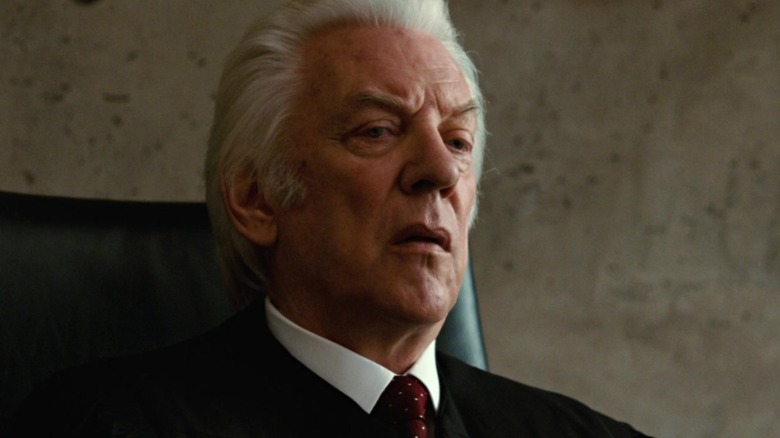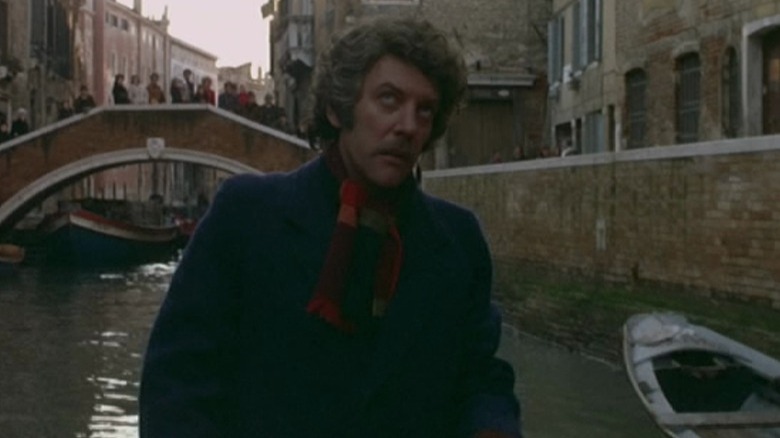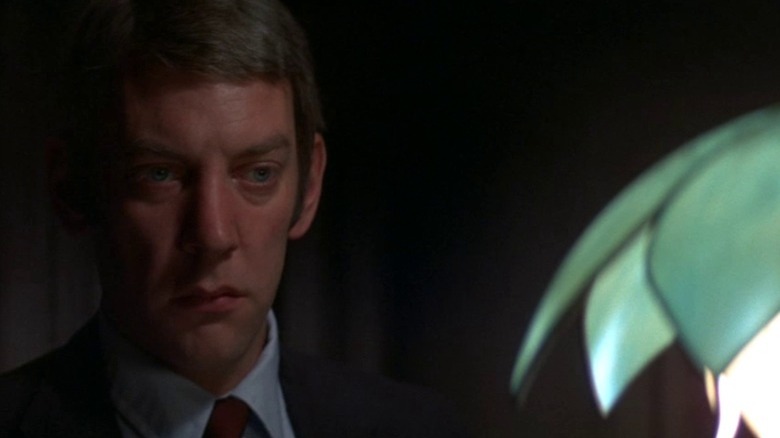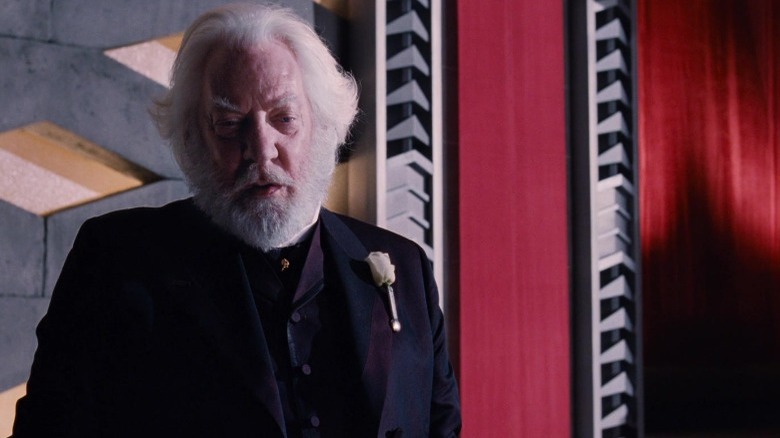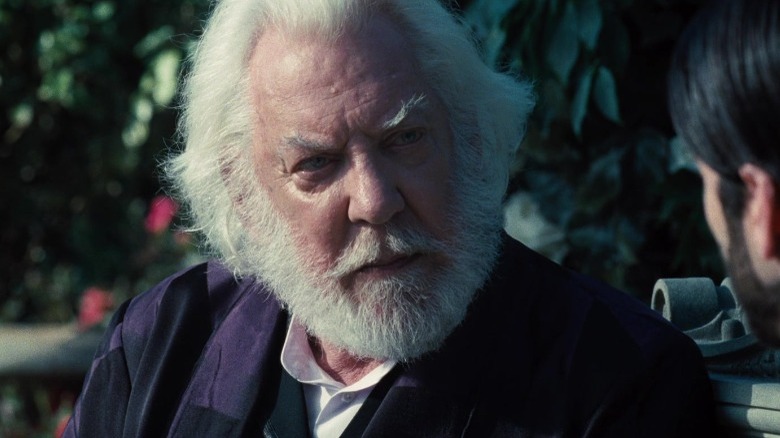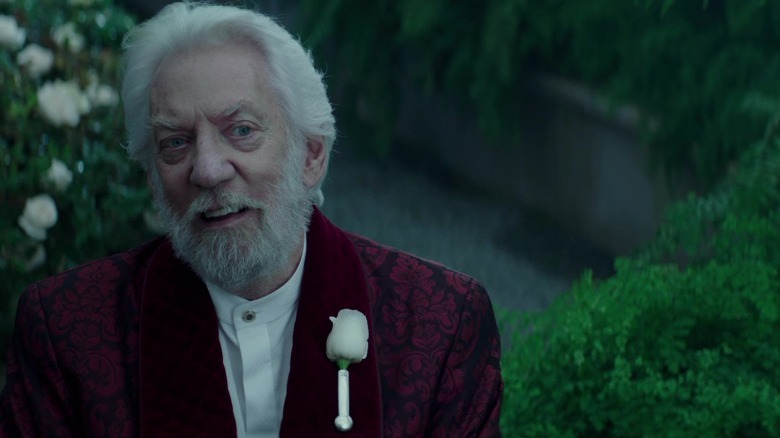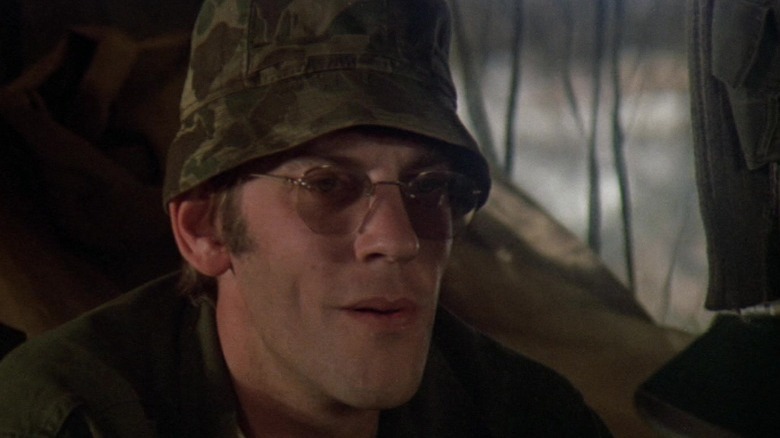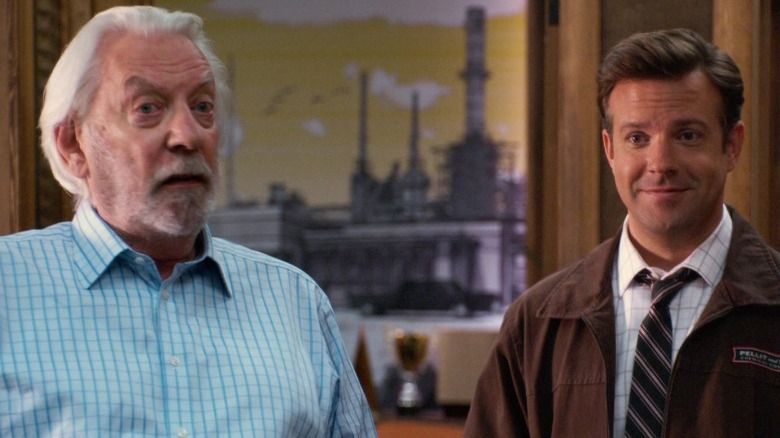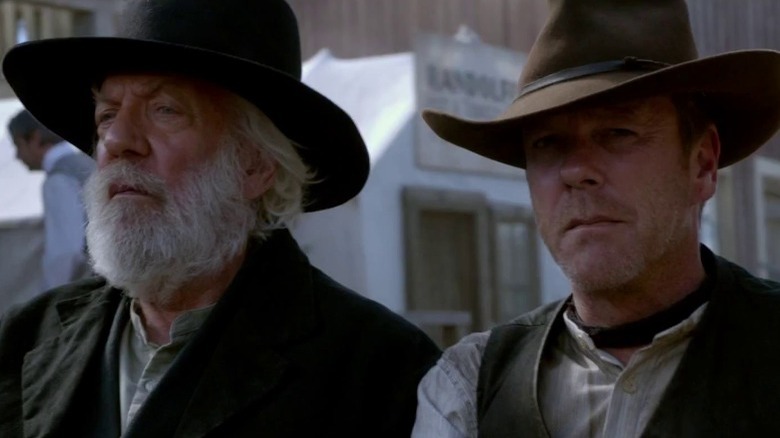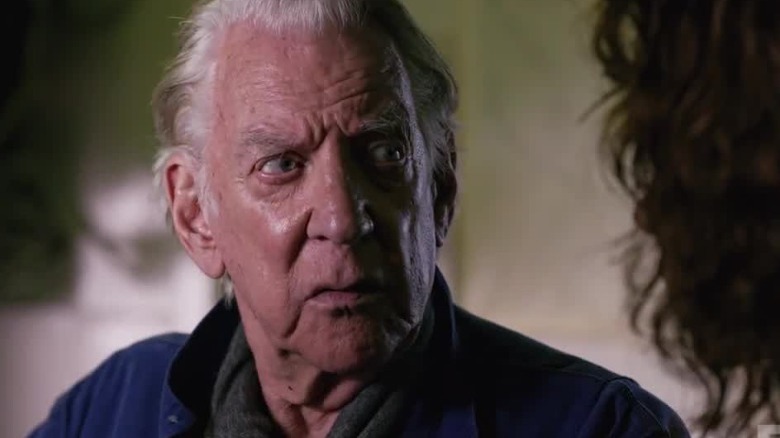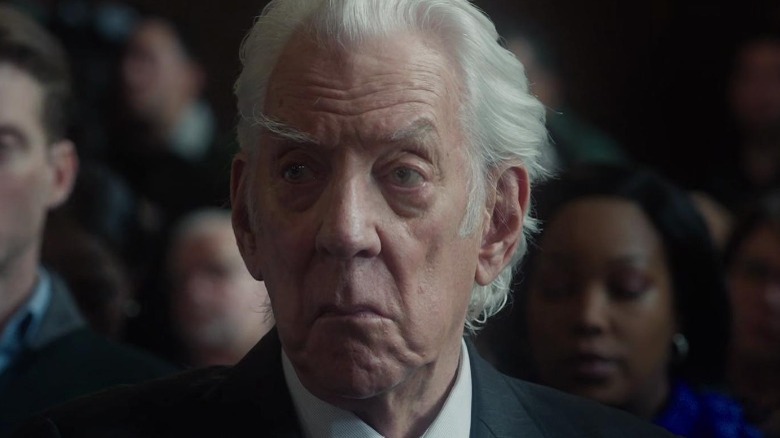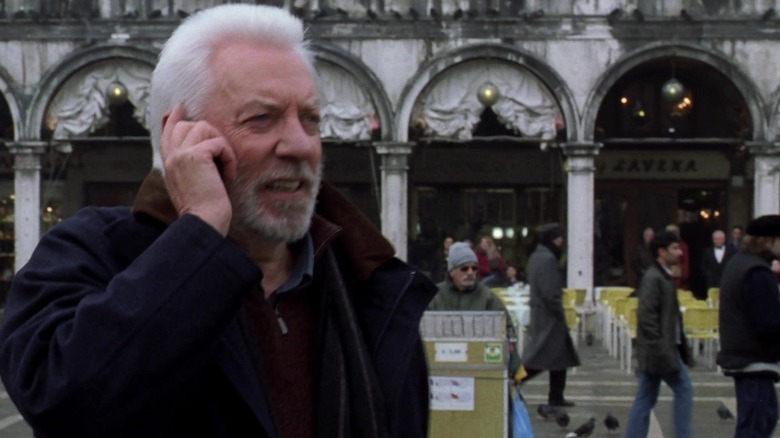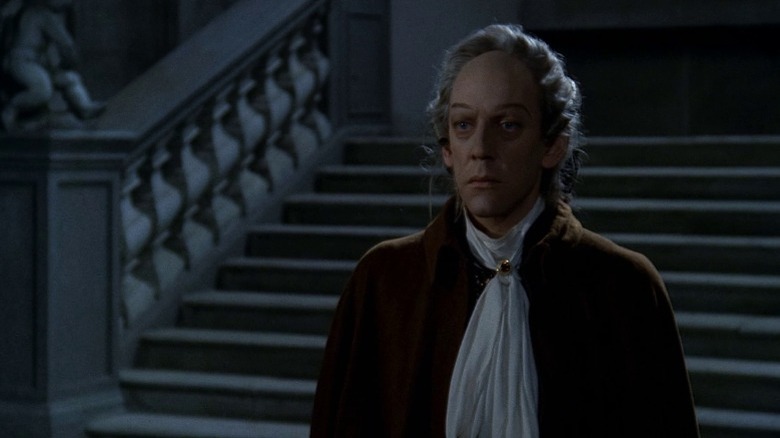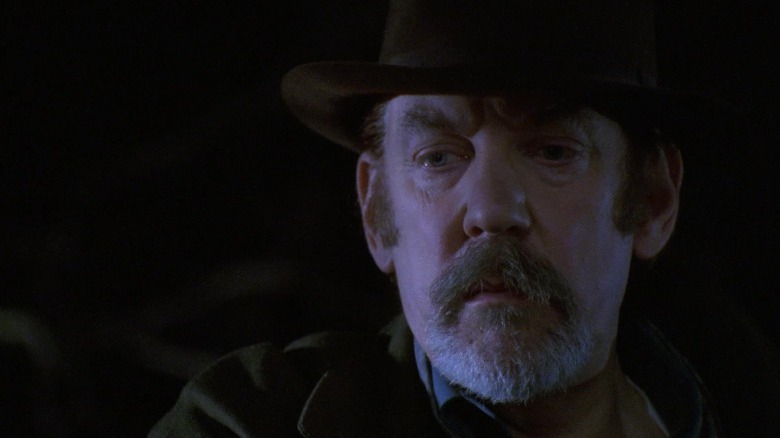The Untold Truth Of Donald Sutherland
Despite boasting a sprawling career that has spanned almost six decades, Donald Sutherland has never been nominated for a best actor Oscar. OK, that could describe almost any actor. Most folks don't have a gold statuette from the Academy displayed on their mantel. But this is rather surprising for Donald Sutherland, who has been in dozens of critically acclaimed films such as "Don't Look Now," "Klute," and "Pride & Prejudice." (He also played a character in "Ordinary People," which won the Oscar for Best Picture.) It's true that Sutherland has been nominated for nine Golden Globes and was even awarded an honorary Oscar for his lifetime of work. But he never got recognized in the official Oscar category for actors. He did, however, earn a spot on GoldDerby's list of "Top 20 greatest living actors never nominated for an Oscar."
Of course, there's more to life than winning Oscars (so we're told, anyway). Maybe it's enough that Donald Sutherland has given us countless memorable characters, including President Snow from "The Hunger Games" and Hawkeye Pierce from "M*A*S*H" (the movie). To honor his career, we've decided to collect some of the most surprising facts about this veteran actor.
At his first audition, he impressed the director – but didn't get the part
Even acting giants like Donald Sutherland have experienced rejection. In fact, for his very first audition, Sutherland came agonizingly close to getting a part in a movie called "Four O'Clock in the Morning," only to lose it.
As Sutherland recalled in an interview with GQ, Sutherland secretly believed that he stood a good chance at getting the part. Later, he got a call from the movie's director, producer, and writer, who were all so inspired by his performance during the audition that they rewrote part of the script just to incorporate the new insight Sutherland had given them on the character. Sutherland remembers the director saying (via GQ), "You created for us exactly the heart and soul of the film."
That's when they broke the news to him: They had decided not to cast him. According to Sutherland (via The Telegraph), the director told him, "We'd always seen this fella as a guy-next-door character ... and to be absolutely truthful, we don't think you look like you've ever lived next door to anybody." Donald Sutherland lost his first film role because he didn't look neighborly enough. "They were telling me this like they thought they were being nice," Sutherland told Backstage. "I sat in a closet for three days."
He shares his earliest childhood memories
As Donald Sutherland recalls in The Daily Record, he was two-and-a-half years old when he spoke his first word: neck. He told Esquire, "My neck was killing me." As it turned out, this was because he had polio. "One leg's a little shorter," he added, "but I survived."
There's one formative moment from Sutherland's childhood that stands out to him above all others. According to The Telegraph, Sutherland ducked out of his engineering class and went to a movie theater instead, where he watched "La Strada." His reaction was, "You can make movies like this?!" according to Rolling Stone. Still riding the wave of exhilaration from that film, Sutherland went to watch another film back-to-back. This time, it was "Paths of Glory," a galvanizing anti-war film. "When I came out of that movie," he told The Guardian, "I was grabbing stones, pieces of gravel, anything, and throwing them at the street, so much was the rage at the injustice that I felt." Sutherland (via Rolling Stone) credits this anecdote as the moment that simultaneously sparked his political passion and inspired his dream to become an actor, which were often intertwined.
He hopes the Hunger Games movies will inspire revolution
Donald Sutherland's activism has often gone hand-in-hand with his acting. In the early '70s, he helped create a documentary called "FTA" (which stood for F*** the Army, a pretty self-explanatory title). More recently, Sutherland has been speaking openly about the real-life political parallels to the "Hunger Games" movies. When asked in an interview for HeyUGuys if he thought those films were thought-provoking, Sutherland replied, "You say they're thought-provoking. I hope they're action-provoking."
Although Sutherland feels that America's youngest generation is not quite as proactive as '60s-era activists ("I just think they're not [organized]," he told The Guardian), he added that "I have great hope and faith in them." Unabashedly admitting that his own generation has "ruined this planet" (HeyUGuys), Sutherland encouraged young people to take matters into their own hands. "If we're going to survive," he said, "it's up to them." And he believes "The Hunger Games" just might be enough to inspire that change.
According to The Telegraph, Donald was thrilled to see perfect strangers give him the three-fingered salute used by the revolution in "The Hunger Games." The salute has even been used by activists protesting a military coup in Thailand.
He loves writing long emails
When Sutherland writes emails, he goes all-out, often composing several paragraphs or more. He is especially fond of following up with his interviewers via email. After he ran out of time for his interview with The Telegraph, Donald replied to his interviewer Robbie Collin two days later; he spent almost 700 words answering Robbie's question about working on "Forsaken." As well, he reached out to Michael Hainey from GQ a week after their interview to explain that he had read Hainey's book, and he loved it.
But perhaps Sutherland's most famous email is the one that landed him a part in the Hunger Games franchise. Donald didn't audition for the role of President Snow. "Nobody asked me to do it," he told GQ. "I wasn't offered it." Instead, he had simply read Gary Ross' script for the movie (which he loved) and decided "[he] wanted to be a part of it." Sutherland was especially intrigued by Snow's character. So he sent Gary a three-page email (later published in Business Insider) explaining what he believed made President Snow tick. "He believes that [the heroine Katniss is] a real threat to his fragile hold on [his] power," he wrote. "She's more dangerous than Joan of Arc." Ross knew right away that he had found President Snow. He hired Sutherland immediately.
He doesn't think President Snow is evil
Donald Sutherland's President Snow is a dictator who maintains control of the dystopian world of Panem by taking his citizens' children — including 16-year-old Katniss (Jennifer Lawrence) — and forcing them to fight to the death on live television. In spite of this, Sutherland can understand where Snow is coming from. "I have a huge affection for him," he told HeyUGuys. After insisting that Snow simply believed he was doing his job of maintaining the country, Sutherland added, "I don't see him as a villain. I see him as a bureaucrat."
Katniss and Snow may be archenemies, but Sutherland says Snow genuinely admires her. He told Variety that Snow views Katniss as "a particular kind of genius he's been looking for all his life." In fact, "If she were his granddaughter, she would rule Panem," he declared in a BBC interview.
That doesn't mean Sutherland thinks Snow (who will be starring in an upcoming "Hunger Games" prequel) can ever truly be redeemed. When asked by The Guardian if Snow's actions were forgivable, Donald shared an anecdote about his former housekeeper who had been raped by her father. According to Sutherland, "She went to see him when he was dying and said, 'I'm here to forgive you.' He said, 'Forgiveness for what? It was my right.'" In other words, he is implying that nothing will justify Snow's actions, but in Snow's mind, it doesn't even occur to him that he has done anything wrong.
If you or anyone you know has been a victim of sexual assault, help is available. Visit the Rape, Abuse & Incest National Network website or contact RAINN's National Helpline at 1-800-656-HOPE (4673)
He's a prankster
Donald Sutherland loves a good joke – sometimes even at somebody else's expense. For instance, Rod Lurie told Variety that when Sutherland first arrived on the set of "Commander in Chief," they handed him his contract, but "he insisted he couldn't sign without his lucky pen." Donald made a show of searching for his missing pen, while the filmmakers squirmed, until finally Sutherland told them he was just kidding and signed the contract.
On another occasion, Donald's plans to go trick-or-treating with his granddaughter were complicated after he broke his leg. "[My family] got tired of pushing my wheelchair," he shared in an interview with GQ, "so they stopped and they put me on the lawn." That's when Sutherland discovered an even more enjoyable way to spend his Halloween. His wife stretched a pair of nylon tights over his head and set a bowl of Halloween candy on his lap. Then Sutherland sat perfectly still, pretending to be a decoration. "People walked by," he said. "Children pleaded for candies in the bowl. Mothers cautioned. Some kids dared." And just when the kids were grabbing their candy, he would suddenly move, scaring the living daylights out of them. "They ran to their mothers," Sutherland added, "but I guarantee those kids will remember it with pleasure forever."
He still gets nervous in front of live audiences
Film is Donald Sutherland's area of expertise, but he's worked with live audiences, too. Speaking to The Los Angeles Times, he joked that his first performance, the play he performed at Toronto University's Hart House Theater at age 11, was the peak of his career. "The audience laughed and applauded when I came on, they applauded when I went off ... I've never had it as good since."
The veteran actor recalls being onstage and banging his foot so hard that his big toenail came off. "But I didn't feel a thing till I walked off stage and I screamed," he told The Daily Record. "Then I went back on stage and again I felt nothing." After earning a People's Choice nomination for his work on "Commander in Chief," Donald was expected to give a speech. The show's director Rod Lurie told Variety, "He wouldn't just read from the teleprompter, he insisted on memorizing his entire speech. As far as he was concerned, it was a performance."
Sutherland admitted to Backstage that he still gets stage fright sometimes. Once he was visiting Idyllwild's theater school to offer a master class to its students, and he discovered that his hands were shaking. "Look at that," he told his audience. "All these years later, I'm still shaking."
He was reluctant to give any acting advice to his son
Donald Sutherland isn't the only actor in the family. His wife, Francine Racette, is a French-Canadian actress. He named all four of his sons after directors, and funnily enough, three of them (Kiefer, Rossif, and Angus) later became actors. After Donald worked together with Kiefer Sutherland on a film for the first time (2015's "Forsaken"), The Today Show asked him if he gave his son any acting advice. Donald said he didn't recall giving his son any advice, except maybe, "Be truthful."
Likewise, in an interview with Jimmy Carter, Sutherland insisted that he definitely didn't try to be an acting coach for Kiefer. "I would never presume to ..." Perhaps one reason why he was reluctant to offer any parental guidance, admitted Sutherland, was the fear of being too harsh on his son. As a kid, he recalls asking, "Mom, am I good looking?" According to Sutherland, she was silent for a long time, until finally she said, "Your face has got character."
Still, Donald remembers Kiefer as a teenager asking for his father's feedback on an upcoming audition. Donald told his son that his performance was "terrific." But Kiefer said, "No, but wait a second. That's the way they want me to do it. Can I show you how I want to do it?" He then gave a reading of the line that his father loved even more. That was how Donald Sutherland knew Kiefer was quite capable of finding his own voice as an actor.
His contract insists that he film scenes from the middle of the movie first
There's one thing that Donald Sutherland is very particular about — so particular, in fact, that he put it in his contract. He insists that the first scene he shoots in any movie comes from somewhere in the middle. In fact, he told Gillian Anderson (while working with her on filming "The Crown") that he always shoots scenes from the middle of the movie for the first two weeks of filming (Collider).
It seems counterintuitive; shouldn't you start at the beginning? But here's what 60-ish years of acting have taught Sutherland. In her interview with Collider. Anderson recalls Sutherland telling her that "you can not necessarily be all there in the middle" and the audience will still believe it so long as "you've gained their trust in the first third of the film." In an interview with The Los Angeles Times, Sutherland says that he spends the first two weeks "zeroing in" on his character until he feels confident enough to film his character's first appearance. "When you do the beginning of a film there can be no hiccups, no bad decisions, because that's the first time people see you. First impressions carry."
He was completely wrong about The Undoing
Though Sutherland is known for playing villains, this was not the case with his performance as Franklin in the HBO series "The Undoing." The show follows a woman named Grace (Nicole Kidman) after her husband Jonathan (Hugh Grant) is placed on trial for murder. Grace cannot accept that her husband could be a killer, despite her father Franklin's insistence that Jonathan can't be trusted.
Hugh Grant knew from the start that his character was the murderer (in fact, he would only agree to take the job if he was the killer, he told Vulture), but other cast members, including Sutherland, were deliberately kept in the dark for most of the shooting. Donald only found out the killer's identity right before they filmed the sixth and final episode. It actually came as a surprise to him. "I always suspected that it was me," Sutherland admitted to Deadline.
This suspicion most likely informed his performance. Whenever Franklin bails Jonathan out of jail, warning him that "I will track you down and I will kill you myself" if he tries to flee, it's easy to believe that Franklin is dead serious about his threat, not least because Sutherland believed it himself. Donald admitted in his interview with Deadline that he was relieved to learn Franklin was innocent.
His secret to a successful marriage: answer the phone
After two previous marriages, Donald Sutherland married Francine Racette, and their marriage has lasted more than 45 years. In fact, many consider the pair to be one of Hollywood's longest-lasting couples. Sutherland told The Guardian, "I think it's like Joanne Woodward ... said, 'Beauty goes and sex goes but my husband makes me laugh every single day.' And so does my wife. We laugh all the time."
That doesn't mean the two never have any friction. At one point, Donald Sutherland was rehearsing to play a character from "Backdraft" who was a pyromaniac. He was still practicing for that character even when he and Francine went on vacation for the summer. Francine reportedly said (via Variety), "Our whole summer was made up of that pyromaniac," which kind of spoiled the vacation for her.
During another interview with The Guardian, Donald's wife called his cell phone. He took the call and murmured, "I'm working darling. I'll see you soon." Afterward, the interviewer asked Sutherland how he managed to maintain a "long, happy union" with Francine since 1972. Was there a trick to it? Grinning, Sutherland replied, "Answer the phone."
He jokes about the most memorable insults he has received
Donald Sutherland has gotten his share of insults, though he seems quite happy to joke about them afterward. He recounts one such incident for The Telegraph. "[A flight attendant in Glasgow] stopped in front of me and said, 'Ye're Donald Sutherland, aren't ye?' And I said, 'Yes.' And she said, '[Ye're] not near as ugly as ye are on the telly.' " In an interview with GQ, Sutherland recalls asking his agent Ron Meyer to get him a part in a movie. "The producer said to Ronny ... 'You would have a better chance getting the part than he would.'" Even when Donald was chosen for his first major role (a soldier pretending to be a general in "The Dirty Dozen"), the director didn't exactly flatter him. After the original actor said he didn't want to make a fool of himself performing that scene, the director pointed to Sutherland and said, "You, with the big ears. You do it" (Variety).
After "M*A*S*H" was released, a Canadian magazine interviewed folks from Donald's hometown, according to Backstage. They even interviewed one of Donald's former classmates, and while they didn't publish that interview, they did share the highlights with Sutherland. Donald's classmate, having never seen "M*A*S*H," was skeptical that Donald was now a Hollywood star, so when asked how he felt about Sutherland's acting career, he said he didn't know. "All he knew for sure," Sutherland says, "[was that] I couldn't be any good because he sat behind me in school."
He has no plans to retire
Donald Sutherland celebrated his 85th birthday in July 2020. He shows no intentions of ever retiring. When an interviewer for Reuters asked Donald Sutherland if he ever imagined not working, the actor replied, "I do imagine it, it's called dying and I try not to imagine too much." It appears Sutherland views retirement as only a last resort. According to Esquire, he finds it "ludicrous" that so many people retire at 65 when the average life span extends for much longer, and he feels that 70 or 75 would be a more appropriate retirement age.
Sutherland seems comfortable with death, or at least comfortable enough to cheerfully add the phrase "dead now" when he describes artists and family members who have passed away (The Telegraph). "I'm getting more accustomed to the idea of being dead," he told GQ. "But I don't want to give up living, because I enjoy it so much, and I love working." Or to put it bluntly, as Sutherland himself did in an interview with BBC: "Retirement for actors is spelt 'DEATH.'"
